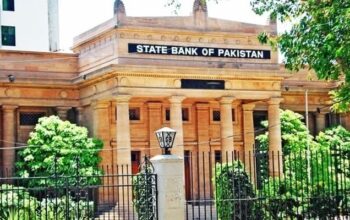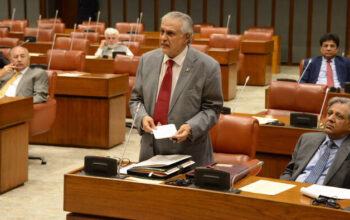By Staff Reporter
ISLAMABAD: Pakistan currently holds sufficient petroleum reserves and faces no immediate threat of supply disruptions, the finance ministry said on Monday, even as escalating tensions between Israel and Iran inject fresh volatility into global oil markets.
Yet, officials warned that escalating tensions in the Middle East could still jeopardize the nation’s energy security and deepen its economic woes, prompting heightened vigilance from a newly formed oversight committee.
The reassurance and warning follow the first meeting of a high-level committee set up by Prime Minister Shehbaz Sharif to keep tabs on fuel pricing and supply chains amid the regional conflict.
Oil markets have been on edge since the latest flare-up between Israel and Iran erupted last week. Brent crude surged about 7% on Friday to near $75 a barrel, though prices softened slightly on Monday after weekend strikes left production and export facilities mostly unscathed.
Still, the specter of disruptions looms large over the Strait of Hormuz, a chokepoint for roughly a fifth of the world’s oil, and Iran’s output of 3.3 million barrels a day remains a wildcard.
Analysts warn that any prolonged price spike could ripple through global freight rates, insurance costs, and inflation, hitting energy-hungry nations like Pakistan hardest.
“The committee expressed satisfaction that Pakistan currently holds adequate stocks of petroleum products and there is no immediate risk of supply disruption,” the finance ministry said in a statement after the meeting, chaired by Finance Minister Muhammad Aurangzeb.
“Nonetheless, members emphasized the need for continued vigilance given the rapidly changing regional context.”
Sharif formed the committee last week as the Israel-Iran conflict intensified, tasking it with tracking futures prices, assessing supply chain stability, and gauging the hit to foreign reserves from oil market swings. The committee is also charged with crafting contingency plans to keep fuel flowing if the situation deteriorates and analysing the fiscal fallout of a drawn-out crisis.
The statement said that to stay ahead of the curve, a working group will monitor developments daily, while the full committee meets weekly to brief the prime minister.
“The Government of Pakistan remains fully committed to maintaining energy security, stabilizing markets, and protecting the national interest during this critical time.”
The committee has been entrusted with monitoring the forward/futures prices of petroleum products and the predictability of supply chains, determining the foreign reserve implications of price volatility in the short and medium term, suggesting a plan, if and when required, to ensure there were no supply disruptions and the market was well supplied, and carrying out a detailed analysis of the fiscal impact in the event of a protracted conflict.
The stakes are high for Pakistan, which leans heavily on imported oil to power its economy. A sustained jump in prices could balloon its current account deficit, stoke inflation, and strain already-thin foreign reserves, all while growth sputters.
Analysts see a cascade of risks: higher import bills crimping monetary policy, shipping delays jacking up costs, and disruptions in the Strait of Hormuz threatening energy supplies and key projects.
The Israel-Iran clash kicked off on Friday with a barrage of Israeli strikes on Iranian nuclear and military sites, which also struck residential zones, killing over 220 people—mostly civilians—according to Tehran. Iran hit back, with Israel reporting 23 deaths from retaliatory attacks. The violence has stoked fears of a wider war, especially given Pakistan’s 909-kilometer (565-mile) border with Iran, stretching from Iran’s Sistan-Baluchestan province to Pakistan’s Balochistan region.
Late Sunday, the government jacked up fuel prices sharply, with petrol rising Rs4.80 per liter to Rs258.43 and high-speed diesel climbing Rs7.95 to Rs262.59, effective immediately. The increases, steeper than industry officials had expected based on mid-June projections, reflect the Middle East’s spiraling tensions and their toll on global oil benchmarks.
Analysts said rising oil prices could sap consumer purchasing power, lift production costs, and pile pressure on an external sector already reeling from low reserves. A blockade or slowdown in the Strait of Hormuz would only deepen the pain, driving up freight charges and snarling trade.
Copyright © 2021 Independent Pakistan | All rights reserved




